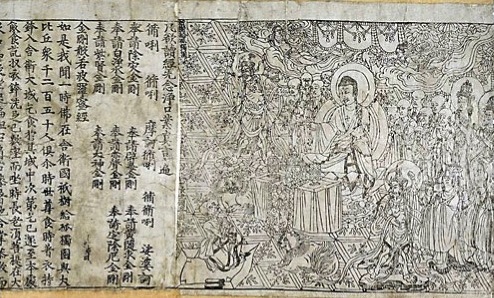Technology and Truth shaping the Soul of the West
As the year 2000 rolled by, western social historians were reflecting that the greatest invention of the previous thousand years was surely the printing press.
And there is little doubt that the printing press inaugurated a new era of learning that birthed modern western civilisation. The invention of the printing press by Gutenberg in the early 15th century has had an almost unfathomable impact on the modern world.
Gutenberg’s Bible, the first book to be printed from the modern press, is described by the British Library as ‘a work of exceedingly high quality which set standards for book production which in many ways are still unsurpassed today.’
An Earlier Printing Press
But interestingly the British Library’s Online gallery also has an exhibit from China, printed in 868. This ancient document was the Buddhist work, ‘The Diamond Sutra’ (see here for both exhibits).

In other words, Chinese technological brilliance had already produced a printing press centuries before Gutenberg’s, during the first millennium. So why did Gutenberg’s press have such wide-ranging impact, and why didn’t the earlier one?
With characteristic insight and authority, Indian scholar and author Vishal Mangalwadi makes the point:
‘One fundamental difference between the West and the East is whether words have meaning or not. Your social historians were saying…that the greatest invention of the last millennium was the printing press…they were all wrong. The Chinese had invented printing 800 years before Gutenberg. Koreans had invented movable metal fonts 500 years earlier. [But] printing had not brought about a Renaissance or Reformation in Asia.
At the end of the first millennium Chinese, Koreans, Tibetans had developed the concept of salvation through rotation…we had great universities, great literature, Buddhist literature,…but what these professors and these monks in the monasteries were doing, they put these books on these rotating shelves and they were sitting and rotating those shelves, not reading those books.
Why? Because [they believed] words have nothing to do with truth. Ultimate reality is silence…‘shunya’, void, emptiness, nothingness. Words or sounds become mantra. When you separate sense from sound. You meditate on sound.
And when you’ve been rotating these shelves for two or three hours your mind begins to go in circles and becomes empty, content-less, void, ‘shunya’, and you have the mystical experience of an altered state of consciousness .
So printing, books [and] literature ceased to have any meaning, great universities disappeared, time froze in Asia.
Words have Meaning
The reason [Gutenberg’s] press began to create the modern world was because behind the printing press, behind those books was an idea that the ultimate reality was not ‘shunya’ or emptiness, nothingness, but ‘logos’, ‘In the beginning was the word and the word was with God and the word was God.’ (John 1:1)
Words are real because there is a personal God who exists.’
(from a lecture entitled, ‘Time and Eternity’ from his series ‘The Book of the Millennium’. To hear the lecture go here )
The Rediscovery of Truth
In other words, it wasn’t the invention of the technology itself that ushered in the new era of reform – it was the truth that the technology conveyed. It wasn’t the press itself, but the gospel of grace that was published on it.
Jesus said, ‘If you continue in My word, then you are truly disciples of Mine; and you will know the truth, and the truth will make you free.” (John 8:31-32 NASB)
As the Scriptures were printed, as Reformers began to make their message known, scholars and preachers had an authoritative standard by which to measure the church, and they had a living word to preach. Great change was on its way, freedom from centuries of superstition – indeed a Reformation and the birth of the modern era.
For more on Vishal Mangalwadi, and details of his superb books, visit http://www.vishalmangalwadi.com/
© 2008 Lex Loizides